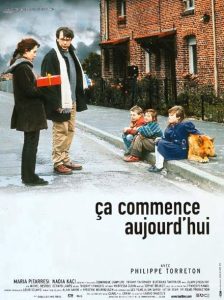“A story can unfold like a dream. You don’t decide when to fall asleep, when to awaken; and yet you keep going, you carry on. You want to be caring about your character, take him by the hand.”
“But you just stand there doing nothing.”
As the opening narrator intones, life is inertia first and foremost. While we dream and make plans, the true potential slips by. The central thesis to the emotionally dense It All Starts Today is that life is the sum of thousands of decisions – to intervene or stand aside as the world awaits our impact. No one victory really defines a person, unless extraordinary circumstances present themselves to one who can earn a Peace Prize. For ordinary grinders like all of us, the only chance to make a difference comes to us in constant waves every day. Those decisions need not be evident, buried in suggestion or gesture as to what an incomplete soul needs. Only the reflection of time and years of experience can determine what would have mattered. Bertrand Tavernier demonstrates in this symphony of a cluttered life that the will to act must be relentless, and perhaps our blind guesses will matter in the long run. We do not get to know whether we made a difference; in the interim, we struggle grimly along darkened hallways.
Daniel Lefebvre is both kindergarten teacher and director of a public school, the two most thankless jobs to exist, apart from perhaps bomb disposal. The small rural town depended on coal mining, and since their closing, the population left behind has been mired in poverty with no real alternatives. The school is poorly funded, overcrowded, and the children are ambulating nightmares. Whereas classes once held thirty children and could get by just fine, today every child is abused, neglected, starving. Lefebvre appears to be a caring teacher, skilled at getting his problem students (all of his students, it appears) to become engaged in the lessons. Interestingly, there are no worksheets or recitation, which is all I remembered from early school. He uses stories and interactive plays, turning his children into writers, performers, and problem solvers.
His true talent, though, lies in simultaneously engaging multiple attacks. While one teacher complains of work hours, he runs off to deal with a child found covered in bruises, calls multiple authorities to find one adequately staffed to deal with the problem, catches a mother staggering to the school to collect her daughter before falling down drunk, repelling a disinterested social worker who only wants to appear to be working, shouting down the mayor for suddenly canceling some of his students’ lunches it just goes on and on. If the film were not so engaging, it would be exhausting to watch. The parents are either disinterested or dimwitted, occasionally abusive. His supervisor regularly grades him poorly, preventing advancement because he constantly takes the administration to task for failing to do anything more profound than covering ass.
Lefebvre is forced to take two children home who are abandoned at school, to find a filthy flat with no electricity or heat, the mother unconscious on the floor. His face reveals a helpless pain as he gently sets the bassinet on the floor amidst rotting trash. He could call the police, who would cart the kids away to foster homes, or social workers who will only note that the children are indeed doing poorly. Instead, he works with the family, contacts the estranged father, and lays the foundation for some recovery. For a while. Effort is not necessarily rewarded, and his crusades are only occasionally helpful. Tavernier is careful to paint the edges of this portrait; the mayor withdrew funding for the school, but if he does not, he loses support to the conservative opposition who would withdraw it anyway. The social workers are overworked with hundreds of impoverished families to track. Helping people in poverty is an endless grind, as slumlords and utilities stand ready to take what little money finds its way through the door. This generation is not as strong as their forebears, parents who decry responsibility and see their children as unexpectedly burdensome. Children who are so vulnerable remain untended except by television, growing up not learning how to talk, work, or think. However the Social Contract translates down to the family level, it finds no purchase here.
Against the tidal wave of ruin that is this town, what difference can one person make? Well, not much, if you want to view the forest, but such a global view is not practical. Our protagonist is a great man, epochal in fact. You may see no evidence for this, but his sustained assault upon the forces degrading his society creates shockwaves that will be felt for generations. Not in any way that gathers headlines, but in the minds of children who did not ask to be here and were influenced by someone who made that effort. Even in the face of a senseless tragedy, his howl of agony is enveloped by the drive to fill this grey, misshapen world with beauty. While the empty suits and placeholders put on shows and make a spectacle of looking busy, this teacher builds mountains. It is a shame that we have flowers for the dead, and contempt for the living.
Tavernier likens the task of building a future to the endless gathering of stones for some potential avail:
“We’ll tell our children it was hard, but our fathers were lords. And this is their legacy: A pile of stones and the courage to lift them.”

